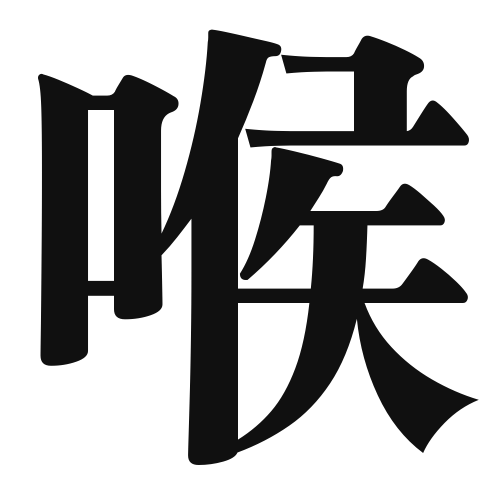1. Overview of Meaning
The kanji “喉” (nodo) means “throat” in English. It refers to the part of the body that connects the mouth and the esophagus, playing a crucial role in breathing, swallowing, and speaking.
2. Formation and Radical
Formation of the Kanji: The kanji “喉” is a phonetic compound (形声文字) that combines the radical for “mouth” (口) with a phonetic component that suggests its pronunciation.
Radical: The radical of “喉” is 口 (kuchi), which means “mouth.” This radical is commonly found in kanji related to speaking or sounds.
3. Examples of Usage
Common Words and Phrases:
- 喉が渇く (nodo ga kawaku) – “to be thirsty”
- 喉の痛み (nodo no itami) – “sore throat”
Example Sentences in Daily Conversation:
- 「喉が渇いたので、水を飲みたいです。」(Nodo ga kawaita node, mizu o nomitai desu.) – “I’m thirsty, so I want to drink water.”
- 「風邪をひいて、喉が痛いです。」(Kaze o hiite, nodo ga itai desu.) – “I caught a cold, and my throat hurts.”
4. Synonyms and Antonyms
Similar Kanji:
- 声 (koe) – “voice”: While “喉” refers specifically to the throat, “声” refers to the sound produced by the vocal cords.
Antonyms:
- 無声 (musei) – “voiceless”: This term refers to the absence of sound or voice, contrasting with the function of the throat in producing sound.
5. Cultural and Historical Background
Relation to Japanese Culture: The throat is often associated with health and well-being in Japanese culture. Traditional remedies for sore throats are common, especially during cold seasons.
Proverbs and Idioms:
- 「喉元過ぎれば熱さを忘れる」(Nodomoto sugireba atsusa o wasureru) – “Once the heat passes the throat, one forgets the pain.” This proverb means that people tend to forget their troubles once they are over.
